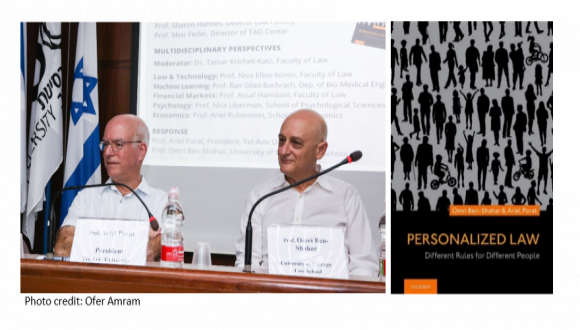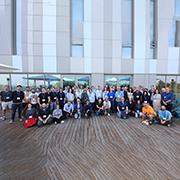Book Launch: Should the Law Be Personalized?
A special event to launch the book, PERSONALIZED LAW: DIFFERENT RULES FOR DIFFERENT PEOPLE, written by Prof. Omri Ben-Shahar and Prof. Ariel Porat
The TAD Center’s AI, Ethics and Law Community, together with the Buchmann Faculty of Law, held a special event to launch the book, Personalized Law: Different Rules for Different People (Oxford University Press, 2021), written by Prof. Omri Ben-Shahar, University of Chicago Law School, and Prof. Ariel Porat, President, Tel Aviv University.
The event started with greetings by Prof. Sharon Hannes, Dean of Law, and Prof. Meir Feder, Head of TAD. The main session included multidisciplinary perspectives by several researchers spanning various disciplines: Prof. Niva Elkin-Koren (Law) who is also a member of the academic management of TAD, Prof. Ran Gilad Bachrach (Biomedical Engineering), Prof. Ariel Rubinstein (Economics), Prof. Nira Liberman (Psychology) and Prof. Assaf Hamdani (Law). Dr. Tamar Kricheli-Katz (Law) was the moderator of the event. Concluding the session, the authors responded to the points raised and shared their views on the future of personalized law.
“The book is an invitation to imagine a world where big data and artificial intelligence are harnessed in governing human behavior. Reflecting on this vision, commentators from different disciplines highlighted the potential gains and risks involved in algorithmic governance, and the importance of a cross-disciplinary effort to make it work for the benefit of society as a whole,” summarized Prof. Elkin-Koren.
The event brought together a large audience from the legal and AI fields.
Book Description:
We live in a world of one-size-fits-all law. People are different, but the laws that govern them are uniform. “Personalized Law”—rules that vary person by person—will change that. Here is a vision of a brave new world, where each person is bound by their own personally tailored law. “Reasonable person” standards would be replaced by a multitude of personalized commands, each individual with their own “reasonable you” rule. Skilled doctors would be held to higher standards of care; the most vulnerable consumers and employees would receive stronger protections; age restrictions for driving or for the consumption of alcohol would vary according to the recklessness risk that each person poses; and borrowers would be entitled to personalized loan disclosures tailored to their unique needs and delivered in a format fitting their mental capacity. The data and algorithms to administer personalized law are at our doorstep, and embryos of this regime are sprouting. Should we welcome this transformation of the law? Does personalized law harbor a utopic promise, or would it produce alienation, demoralization, and discrimination? This book is the first to explore personalized law, offering a vision of law and robotics that delegates to machines tasks traditionally performed by humans. It inquires how personalized law can be designed to deliver precision and justice and what pitfalls the regime would have to prudently avoid.
See link to the book on the publisher’s website:
https://global.oup.com/academic/product/personalized-law-9780197522813?cc=il&lang=en&#





